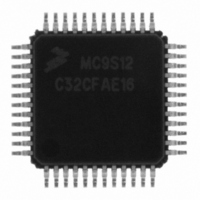MC9S12C32CFAE16 Freescale Semiconductor, MC9S12C32CFAE16 Datasheet - Page 158

MC9S12C32CFAE16
Manufacturer Part Number
MC9S12C32CFAE16
Description
IC MCU 32K FLASH 16MHZ 48-LQFP
Manufacturer
Freescale Semiconductor
Series
HCS12r
Datasheets
1.MC9S12GC16MFUE.pdf
(690 pages)
2.MC9S12C96CFUER.pdf
(26 pages)
3.MC9S12C32CFAE25.pdf
(2 pages)
Specifications of MC9S12C32CFAE16
Core Processor
HCS12
Core Size
16-Bit
Speed
16MHz
Connectivity
CAN, EBI/EMI, SCI, SPI
Peripherals
POR, PWM, WDT
Number Of I /o
31
Program Memory Size
32KB (32K x 8)
Program Memory Type
FLASH
Ram Size
2K x 8
Voltage - Supply (vcc/vdd)
2.35 V ~ 5.5 V
Data Converters
A/D 8x10b
Oscillator Type
Internal
Operating Temperature
-40°C ~ 85°C
Package / Case
48-LQFP
Cpu Family
HCS12
Device Core Size
16b
Frequency (max)
16MHz
Interface Type
CAN/SCI/SPI
Total Internal Ram Size
2KB
# I/os (max)
31
Number Of Timers - General Purpose
8
Operating Supply Voltage (typ)
2.5/5V
Operating Supply Voltage (max)
2.75/5.5V
Operating Supply Voltage (min)
2.35/2.97V
On-chip Adc
8-chx10-bit
Instruction Set Architecture
CISC
Operating Temp Range
-40C to 85C
Operating Temperature Classification
Industrial
Mounting
Surface Mount
Pin Count
48
Package Type
LQFP
Package
48LQFP
Family Name
HCS12
Maximum Speed
16 MHz
Operating Supply Voltage
2.5|5 V
Data Bus Width
16 Bit
Number Of Programmable I/os
31
Number Of Timers
8
For Use With
CML12C32SLK - KIT STUDENT LEARNING 16BIT HCS12
Lead Free Status / RoHS Status
Lead free / RoHS Compliant
Eeprom Size
-
Lead Free Status / Rohs Status
Compliant
Available stocks
Company
Part Number
Manufacturer
Quantity
Price
Company:
Part Number:
MC9S12C32CFAE16
Manufacturer:
Freescale Semiconductor
Quantity:
10 000
- Current page: 158 of 690
- Download datasheet (4Mb)
Chapter 5 Interrupt (INTV1) Block Description
The interrupt sub-block decodes the priority of all system exception requests and provides the applicable
vector for processing the exception. The INT supports I-bit maskable and X-bit maskable interrupts, a non-
maskable unimplemented opcode trap, a non-maskable software interrupt (SWI) or background debug
mode request, and three system reset vector requests. All interrupt related exception requests are managed
by the interrupt sub-block (INT).
5.1.1
The INT includes these features:
5.1.2
The functionality of the INT sub-block in various modes of operation is discussed in the subsections that
follow.
158
•
•
•
•
•
•
•
•
•
•
•
•
•
•
•
•
Provides two to 122 I-bit maskable interrupt vectors (0xFF00–0xFFF2)
Provides one X-bit maskable interrupt vector (0xFFF4)
Provides a non-maskable software interrupt (SWI) or background debug mode request vector
(0xFFF6)
Provides a non-maskable unimplemented opcode trap (TRAP) vector (0xFFF8)
Provides three system reset vectors (0xFFFA–0xFFFE) (reset, CMR, and COP)
Determines the appropriate vector and drives it onto the address bus at the appropriate time
Signals the CPU that interrupts are pending
Provides control registers which allow testing of interrupts
Provides additional input signals which prevents requests for servicing I and X interrupts
Wakes the system from stop or wait mode when an appropriate interrupt occurs or whenever XIRQ
is active, even if XIRQ is masked
Provides asynchronous path for all I and X interrupts, (0xFF00–0xFFF4)
(Optional) selects and stores the highest priority I interrupt based on the value written into the
HPRIO register
Normal operation
The INT operates the same in all normal modes of operation.
Special operation
Interrupts may be tested in special modes through the use of the interrupt test registers.
Emulation modes
The INT operates the same in emulation modes as in normal modes.
Low power modes
See
Section 5.4.1, “Low-Power
Features
Modes of Operation
MC9S12C-Family / MC9S12GC-Family
Modes,” for details
Rev 01.24
Freescale Semiconductor
Related parts for MC9S12C32CFAE16
Image
Part Number
Description
Manufacturer
Datasheet
Request
R
Part Number:
Description:
Manufacturer:
Freescale Semiconductor, Inc
Datasheet:
Part Number:
Description:
Manufacturer:
Freescale Semiconductor, Inc
Datasheet:
Part Number:
Description:
Manufacturer:
Freescale Semiconductor, Inc
Datasheet:
Part Number:
Description:
Manufacturer:
Freescale Semiconductor, Inc
Datasheet:
Part Number:
Description:
Manufacturer:
Freescale Semiconductor, Inc
Datasheet:
Part Number:
Description:
Manufacturer:
Freescale Semiconductor, Inc
Datasheet:
Part Number:
Description:
Manufacturer:
Freescale Semiconductor, Inc
Datasheet:
Part Number:
Description:
Manufacturer:
Freescale Semiconductor, Inc
Datasheet:
Part Number:
Description:
Manufacturer:
Freescale Semiconductor, Inc
Datasheet:
Part Number:
Description:
Manufacturer:
Freescale Semiconductor, Inc
Datasheet:
Part Number:
Description:
Manufacturer:
Freescale Semiconductor, Inc
Datasheet:
Part Number:
Description:
Manufacturer:
Freescale Semiconductor, Inc
Datasheet:
Part Number:
Description:
Manufacturer:
Freescale Semiconductor, Inc
Datasheet:
Part Number:
Description:
Manufacturer:
Freescale Semiconductor, Inc
Datasheet:
Part Number:
Description:
Manufacturer:
Freescale Semiconductor, Inc
Datasheet:











